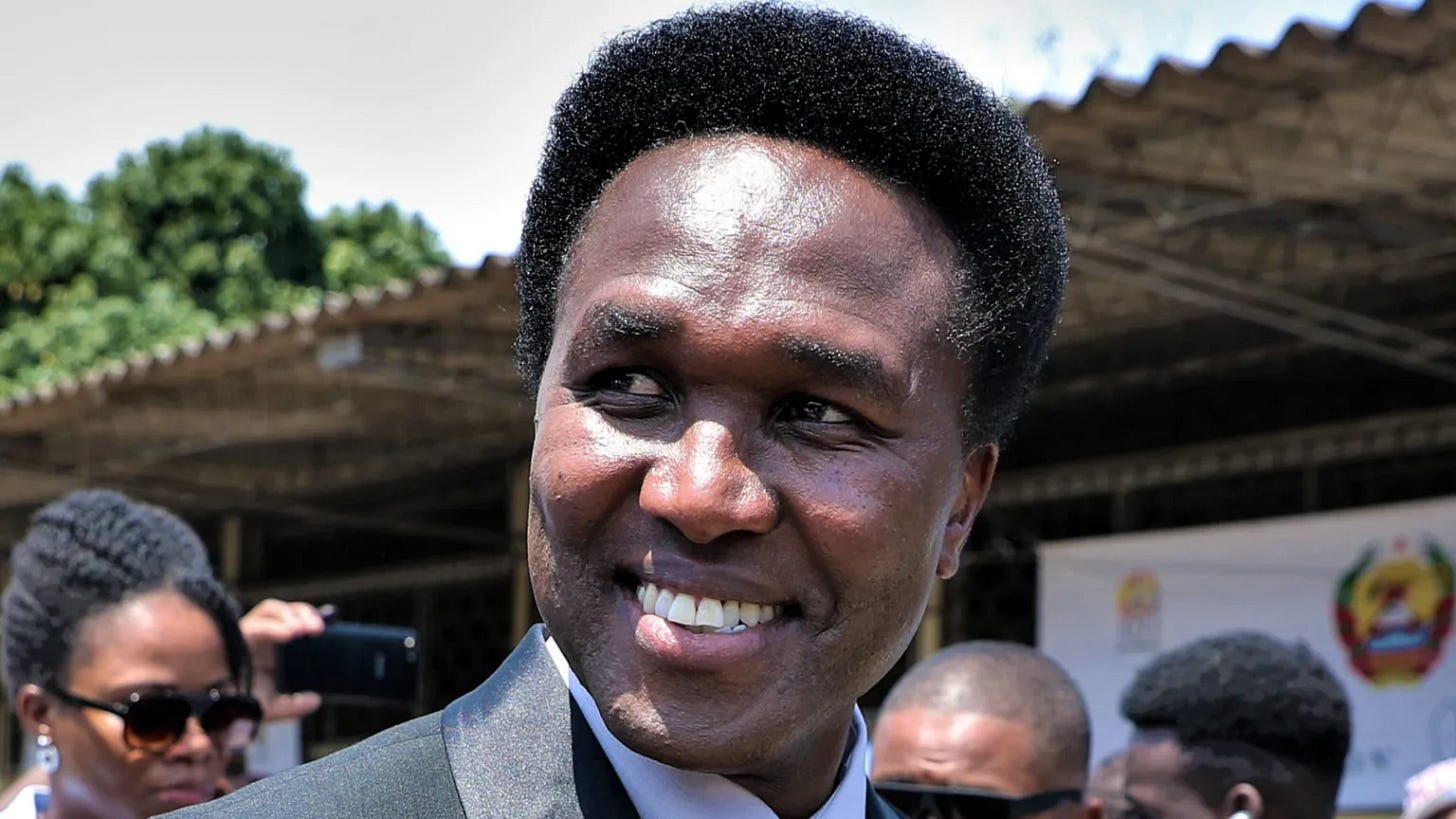A mere 1.5 kilometers separate Mozambique’s new President, Daniel Chapo, from his strongest political rival, Venâncio Mondlane. But in a nation where political distances were once considered unbridgeable, those short kilometers speak volumes.
President Chapo was inaugurated last week at the Palácio da Ponta Vermelha, a modernist edifice perched regally over Maputo Bay. Meanwhile, his rival, Mondlane, has turned the City Lodge Hotel into his de facto headquarters, brimming with diplomats, investors, and curious onlookers. What many in Mozambique and beyond find most striking is not just the proximity but the mood: Mondlane may be living out of a hotel suite, but he wields influence that extends far beyond its walls.
Venâncio Mondlane. Image Source: BBC
The Disputed Election and Its Aftermath
Mondlane, a 51-year-old engineer-turned-politician, stunned Mozambique’s political establishment in the last presidential race. His underdog campaign, initially dismissed by major parties, galvanized widespread frustration over Frelimo’s long-standing governance record and allegations of corruption. Officially, the electoral commission declared Frelimo’s Daniel Chapo as the winner—continuing the party’s unbroken run at the top. Yet, observers from civil society and several independent organizations flagged large-scale electoral irregularities, sparking some of the most significant protests in Mozambique’s post-independence history.
The state crackdown that followed resulted in hundreds of casualties and thousands of arrests. Mondlane fled the country, migrating through an array of destinations—South Africa, Germany, the Netherlands, the UAE, Oman, Nigeria, and Qatar—before carefully returning to Maputo months later. Thanks to his new international profile, Mondlane now carries an aura of both celebrity and caution. His bank accounts remain frozen, legal cases continue to mount, and his personal safety is far from assured. Even so, he presses on from his temporary base to build a “shadow government,” determined to translate the public’s support into tangible political power.
Policy Parallels and ‘Copycat’ Claims
At President Chapo’s subdued inauguration ceremony, the new head of state outlined a set of reforms that had a familiar ring to many ears. Chapo promised to streamline government ministries, reduce financial perks for top officials, and impose a more transparent public procurement system. Skeptics noted these were cornerstone proposals of Mondlane’s electoral platform—once dismissed by Frelimo as “utopian” or “impossible.”
“I’m not accusing him directly of copying my ideas,” Mondlane quipped in an interview widely shared on local channels and covered by international outlets like the BBC and CNN. “But if the policies I championed lead to cleaner governance and curb corruption, it’s proof that sometimes the original plan remains the best.”
And therein lies the dilemma for Frelimo. Implementing these measures requires the party to antagonize vested interests—powerful networks built over decades of political dominance. Mondlane questions Chapo’s willingness to confront entrenched elites and forego the traditional spoils of victory. “Breaking a 50-year paradigm isn’t for the faint of heart,” he cautioned.
A Shadow That Won’t Fade
Much like insurgent figures across Africa—think Ousmane Sonko and Bassirou Diomaye Faye in Senegal, or Peter Obi in Nigeria—Mondlane has electrified disenchanted voters by positioning himself as an alternative to the established political order. Even though he did not clinch the presidency, Mondlane refuses to fade into the background.
His “shadow cabinet” aims to hold President Chapo accountable. Beyond that, Mondlane has taken the provocative step of urging citizens to withhold taxes—a move that exposes the fragility of state finances and underscores the breadth of his popular appeal. The new administration, in turn, faces a delicate balancing act: deliver the reforms that placated protestors without surrendering all the powers historically enjoyed by Frelimo.
The High-Stakes Resource Question
At the center of Mozambique’s trajectory is the development of natural gas resources in the country’s north—estimated to be worth tens of billions of dollars. Corruption scandals have already swirled around these extractive industries, raising concerns both locally and internationally. News agencies like Al Jazeera and Africa-focused outlets such as PANA underscore how these resources could be a game-changer for the entire Southern African region—if managed transparently and ethically.
Mondlane’s stance is clear: such a valuable national asset must benefit ordinary Mozambicans rather than a privileged few. By signaling a readiness to collaborate with President Chapo’s administration—if the government adopts genuinely inclusive practices—Mondlane holds substantial leverage. The mere prospect of large-scale protests tied to resource governance has the potential to roil international investors and donors alike.
Despite the tension and uncertainty, Mozambique stands on the cusp of meaningful change. Both Mondlane and President Chapo have publicly embraced the need for leaner government, honest procurement processes, and a clampdown on systemic corruption. Here are key recommendations to ensure progress:
Inclusive Policy Forums: Establish bipartisan committees and public consultation platforms where citizens, civil society, and opposition leaders can shape resource governance strategies—particularly around natural gas projects.
Digital Innovations: Fast-track the digitization of government services and procurement systems. This reduces opportunities for graft and increases transparency, helping restore public confidence.
Decentralized Oversight: Allocate budgetary oversight powers to regional and local bodies. Grant communities a direct stake in managing revenue from natural resources, mirroring successes in other African nations that have embraced local ownership frameworks.
Protect Civil Liberties: Deepen international partnerships—through organizations like the African Union, SADC, and even the UN—to guarantee fair legal treatment for activists and opposition figures. Security and human rights must go hand in hand.
Mobilize Human Capital: Empower Mozambican youth with vocational and tech training, especially in sectors linked to natural resource extraction. A well-trained workforce is essential for creating equitable opportunities and reducing economic inequality.
Mozambique’s current scenario is undoubtedly fraught with challenges—but it also holds unprecedented promise. If the country harnesses political will, robust institutions, and technological breakthroughs, it can transform natural resource wealth into sustainable development. And if both the ruling party and dynamic opposition leaders like Mondlane champion a forward-looking, inclusive model of governance, they could spark a new era for Mozambican politics—one that resonates across the continent and beyond.
#MozambiquePolitics #InclusiveLeadership #GoodGovernance #AfricaNews #PolicyDigest #ResourceManagement #DigitalInnovation #SocialJustice
Subscribe today and be part of our growing community dedicated to inclusive policy solutions across Africa and the world.





